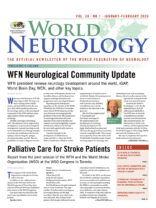Author visited Postgraduate Institute of Medical Education & Research (PGIMER) in Chandigarh, India.
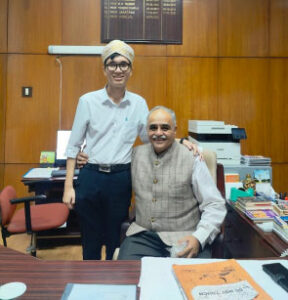
Professor Vivek Lal on my last day at PGIMER.
By Dr. Duc Nguyen
2023 was a special year for me, a Vietnamese neurology resident, as I was honored to join the first Asian Department Visit Program by the World Federation o
f Neurology (WFN) and the Indian Academy of Neurology (IAN). This program allows young neurologists from low- to middle-income Asian countries to visit the Postgraduate Institute of Medical Education & Research (PGIMER), Chandigarh, India, and learn from its neurology department. Thanks to the arrangement of WFN and IAN, I achieved all the objectives of the program and more.
During my time at Nehru Hospital, I had the opportunity to deepen my expertise in neuro-ophthalmology, a specialty for which the hospital’s neurology department is renowned. The faculty and residents at PGIMER shared their extensive knowledge and invaluable experience with me, enhancing my clinical acumen to diagnose and manage conditions, such as idiopathic intracranial hypertension (IIH), IgG4-related diseases, and ischemic optic neuropathy. For instance, I now place greater emphasis on measuring cerebrospinal fluid (CSF) pressure in patients who exhibit headache and disc edema, which are indicative of IIH.
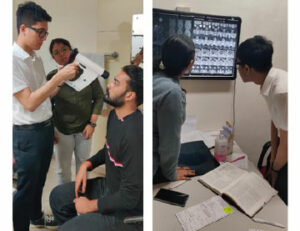
I learned to use a handheld fundus camera and discussed a case of idiopathic intracranial hypertension in the neuro-ophthalmology clinic.
Another area that I gained an understanding was the approach to the patients suspected of vasculitis as a cause of stroke in young individuals and as a differential diagnosis for demyelinating diseases. This has heightened my awareness significantly of angiitis, marking an essential first step in the diagnostic process that could ultimately help prevent further deterioration.
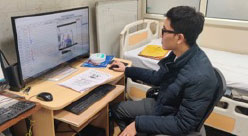
The EEG laboratory was where I visited to learn every afternoon.
I was impressed by the efficiency of using information technology in outpatient settings. It streamlined patient management by saving time, ensuring thoroughness, and providing a concise summary of the patient’s extensive history. In addition, my clinical skills, knowledge, and critical thinking have been enriched, particularly in formulating a working diagnosis list. I have also acquired valuable insights into maintaining an efficient medical and educational system within a dynamic environment.
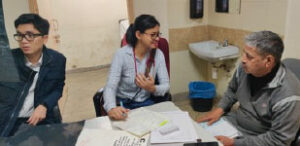
Dr. Tanya Banerjee (right) and me in the outpatient setting.
As Prof. Aastha from PGIMER said, “The experience is more important than the knowledge.” The Department Visit Program enabled me to immerse myself in an international academic environment, gain insight from diverse clinical contexts, network with new colleagues, and promote collaboration between countries. These experiences empower me to expand my knowledge and skills, foster my professionalism, and consequently help me advance the neurology specialty in my country. Hence, I strongly recommend this scholarship to young neurologists, especially trainees like me. I wish WFN, IAN, and PGIMER continued success with the future Asian Department Visit Programs.
Acknowledgment
I am grateful to the World Federation of Neurology, Indian Academy of Neurology, and Post-graduate Institution of Medical for organizing such a valuable Department Visit Program for developing countries. I thank Prof. Vivek Lal and Prof. Aastha Takkar Kapila for their thoughtful and considerate arrangement for my stay. I also appreciate the hospitality and kindness of all the faculty members and residents of the Neurology Department from Nehru Hospital. •
Dr. Duc Nguyen is a neurology resident at the University of Medicine and Pharmacy at Ho Chi Minh City, Vietnam.
